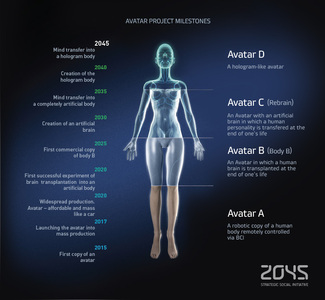/ Immortality Corporation Vision
Dear friends,
Let me introduce you the Immortality Corporation work schedule.
The schedule is based on the analysis of the already existing research programs of "2045" Initiative Group Members, as well as other scientific communities from Russia and abroad.
Artificial Body Research and Development will be divided into several tracks, to be pursued simultaneously.
The four tracks and their suggested deadlines are optimistic but feasible. This is our program for the next 35 years, and we will do our best to complete it.
The fourth development track seems the most futuristic one. It’s intent is to create a holographic body. Indeed, its creation is going to be the most complicated task, but at the same time could be the most thrilling problem in the whole of human evolution. Perhaps it is the ‘radiant mankind’ Konstantin Tsiolkovsky wrote about.
We are in the process of creating focus groups of experts. Along with these teams, we will prepare goal statements and research programs schedules.
We invite interested specialists to contact us and join the discussion. We welcome your contribution.
Dmitry ITSKOV
/ experts
- Correspondent member of RAS, professor of the Moscow State University, head of the laboratory “Psychology of communications and psychosemantics” (MSU)
 Viktor F.
Viktor F.
Petrenko"I think that as a working hypothesis, it is possible that forms of contacts with highly advanced civilizations are possible as a result of this profound meditation..."
- Doctor of physics and mathematics, Head of the Department of Neuroinformatics at the Center for Optical Neural Technologies of the Scientific Research Institute for System Analysis of the Russian Academy of Sciences
 Witali L.
Witali L.
Dunin-Barkowski' If the job is to be taken seriously, we can get a detailed model of a brain prototype within five years or so. And since many research areas concerned with the subject develop in parallel, it may well be that we can achieve these results even faster...'
- PhD, Professor of Oxford University, co-founder (with David Pearce) of the World Transhumanist Association
 Nick
Nick
Bostrom"The digital path [of extreme longevity] would be, if we could develop technology eventually to do human whole brain emulation, where we would create a very detailed model of a particular human brain and then emulate that in the computer, where we would have an indefinite life span potential, we could make backup copies and so forth..."
- Ph.D. in Technical Sciences
 Professor Aleksandr A.
Professor Aleksandr A.
BOLONKIN‘An artificial mechanical body will have great power and withstand extreme environmental conditions: high temperature, pressure, radiation, space...’
- President of the Center for Cellular and Biomedical Technologies, First Moscow Medical University and expert on the conscious management of health, biotherapy and the prevention of aging
 Dmitry A.
Dmitry A.
SHAMENKOV‘The body gradually becomes artificial; new tissues replace existing ones, and new media, somehow extending the limits of our body, are being invented. Of course, man and technology are being knitted together. Step by step, we are moving towards the formation of a cybernetic organism...’
- President of Neyrobotiks
 Vladimir A.
Vladimir A.
KONYSHEV‘The transfer of the brain into an artificial body, more enduring, more perfect, is the only way the human race to stay on Earth...’
- Professor at the University of Southern Maine, co-chairman of GF2045
 Barry
Barry
Rodrigue"While innovation is often presented as a technological process, it also needs to be applied everywhere and to everything. We need innovation in human affairs, from family relations to business affairs. Innovation has to address both ecological balance of species and destruction of inorganic habitats. Alternatives must be found for warfare and the arms industry. In short, innovation is a process that applies to all existence..."
- Ph.D. in Chemistry, Head of the Chemical Enzymology Department at the Moscow State University, corresponding member of the Russian Academy of Sciences, Director of the Institute of Biochemical Physics (Russian Academy of Sciences)
 Professor Sergey V.
Professor Sergey V.
VARFOLOMEEV‘An electronic version of the brain is needed. The physical brain, in my opinion, can not be a subject of study, since it is very subtle. But an electronic analog having all the receptor equipment and the same story, incentives, motivation - it might be very interesting...’
- Ph.D. in Biology, Inventor of the "Bioartificial liver" device
 Professor Vyacheslav Y.
Professor Vyacheslav Y.
RYABININ - Ph.D. in Medicine, Head of the Cells and Tissues Growth Laboratory of Theoretical and Experimental Biophysics (Russian Academy of Sciences)
 Professor Boris K.
Professor Boris K.
GAVRILYUK“For skin on a cyborg, you simply need to create a nutrition system. And basically . . . we are not really complex in design! There are only a few systems: the circulatory system carries oxygen and nutrients; the excretory system extirpates the waste. The rest is end-effectors. To begin we can create a very simple living organism—then, later, more complex systems. . . .”
- Russian futurologist writer, journalist
 Maxim
Maxim
Kalashnikov"This is something that nobody in the world could pass up. Creation of super- and posthuman, I believe, is a gaining of new strength while saving from degeneration and extinction, . This could potentially make Russia the world leader…’









 LinkedIn
LinkedIn
 LiveJournal
LiveJournal
 Google
Google
 Twitter
Twitter
 Facebook
Facebook
 Я.ру
Я.ру
 ВКонтакте
ВКонтакте
 Mail.ru
Mail.ru